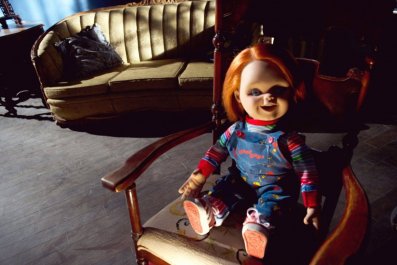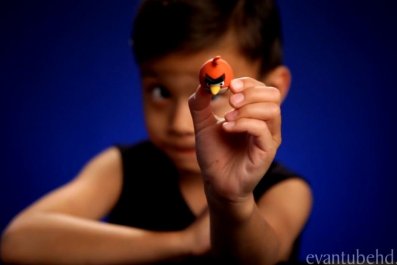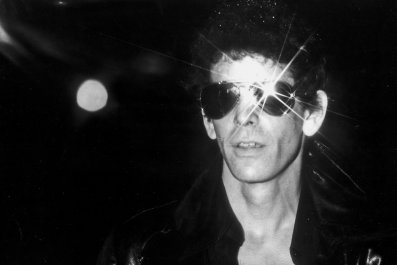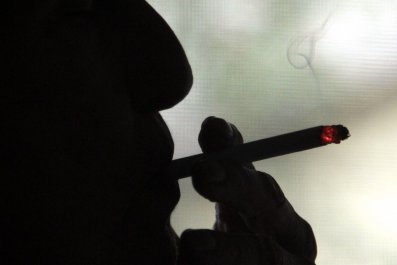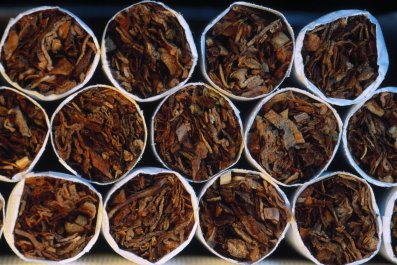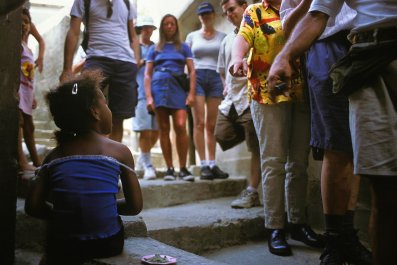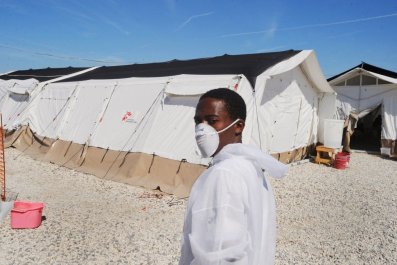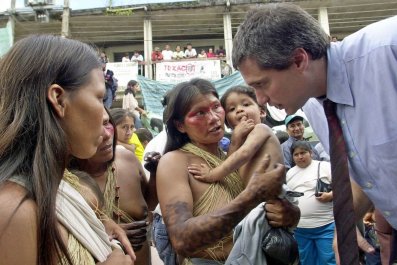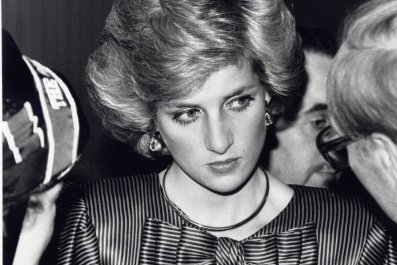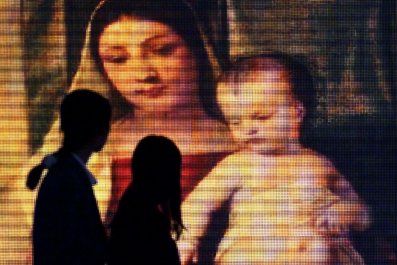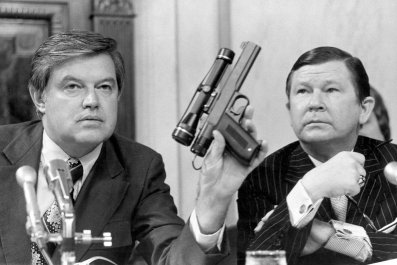When you're interviewing someone who has spent much of her professional career sitting exactly where you are - setting up the recorder, asking the questions rather than answering them - there is a point when you sense that you, too, are being interviewed. This happened twice during my conversation with Barbara Kopple, the two-time Academy Award-winning filmmaker who has profiled everyone from Mike Tyson (Fallen Champ) to the Dixie Chicks (Shut Up and Sing) and female war correspondents (Bearing Witness).
The first time was when I asked Kopple how long she had lived in New York City. "I was in my early 20s," said Kopple, who grew up in Scarsdale and studied psychology at Northeastern University before moving to Manhattan. "I'm a New York girl," she added. "Did you live other places?"
That was the easy question. The warm-up.
Kopple's new documentary, Running From Crazy, which premieres on November 1, is a captivating journey through the iconic Hemingway family's lethal combination of brilliance, beauty, and self-destruction - and actress-writer Mariel Hemingway's determination to overcome it.
Later in our conversation, Kopple explained that her first interview with Mariel lasted more than three hours. She just sat there talking, "saying extraordinary things and answering every question without flinching," Kopple said. And Mariel has a lot to flinch about: family suicides and abundant mental illness, strained relationships with her sisters and emotionally distant parents. Then Kopple asked me: "Does your family have mental illness or suicide?"
"No!" I said. But it occurred to me that I had misspoken. "Actually, my grandmother's father committed suicide when she was 5 years old," I said. She was told a vague story about her father having appendicitis; it wasn't until decades later that a relative casually mentioned to my grandmother that her father had killed himself by jumping out of a hotel window.
"He thought I knew," my grandmother told me before she died. "It seemed to be a perfectly natural thing to tell.... Afterwards, I asked my mother, 'Why didn't you ever tell me?' She said, 'I just couldn't.' I think besides the fact that he died - that he killed himself - it was considered a black mark on a family."
It still is, and Running From Crazy illuminates the dark, complex, painful places that mental illness takes people, the damaging heritage it leaves behind, and the ways in which survivors overcome it (or don't). The film is a deep dive into the Hemingway legacy and the people capsized by its wake.
* * *
Mental illness seems to have sprouted from every limb of the Hemingway family tree. Seven of Mariel's relatives committed suicide, including her grandfather, the legendary writer Ernest Hemingway, who shot himself in 1961 at the age of 61, just a few months before she was born. A day shy of the 35th anniversary of Ernest's death, Mariel's older sister, Margaux, one of the highest paid models of the 1970s, killed herself by overdosing on phenobarbital. She was 42. Ernest's father, brother and sister also committed suicide, as did another one of Mariel's great-grandfathers.
"I want to change the dynamic," Mariel, 51, says in the film. "It's not a family of tragedies but a family of complete and total embrace of joy. That's what I want, at least, to be able to give my daughters, so they don't have to carry the burden of thinking, Oh, because there's mental illness in my family, I'm gonna go crazy."
Running From Crazy takes us back to Mariel's childhood in Ketchum, Idaho, where she learned at an early age to be the controlled, caretaking foil to her family's craziness. Her father, Jack (Ernest's eldest son) was an avid outdoorsman and a heavy drinker; her mother, Byra (Puck), was an icy beauty - "a bitch," Mariel says - who rationed affection as if it was the last two fingers of gin in the bottle. Evenings typically began with amicable conversations, then descended into loud, drunken fights and broken bottles. (The family called this "wine time.") Mariel was usually the one who cleaned up the broken glass. She also spent years of her childhood caring for Puck, who was diagnosed with cancer when Mariel was 11 years old.
Eleven years younger than her sister Joan (Muffet) and seven years younger than Margaux, Mariel was a reproductive "mistake," she says, in a family predisposed to unraveling. Muffet, beautiful and creative, struggled with drugs and was eventually diagnosed with bipolar disorder. (She has spent her life in and out of mental institutions.) Margaux, too, was a wild child. Armed with her beauty, infectious personality, and famous last name, she left home at the age of 19 and landed a $1 million contract as the new face of Fabergé's Babe perfume in 1975. That same year, she graced the cover of Time. But for all her successes, Margaux resented Mariel for stealing the spotlight both in their family (she cut off Mariel's eyelashes when she was a little girl: "It would be my luck that they grow back thicker," Margaux confesses) as well as publicly (Mariel got the rave reviews for her supporting part in the 1976 film Lipstick, which was supposed to have been Margaux's great Hollywood debut).
The film is saturated with searing confessions. The Hemingways teased Margaux about her weight, calling her "big pants." Mariel admits that she thought Margaux was stupid. But the most stunning admission comes about an hour in, when Mariel says she believes her father sexually abused Muffet and Margaux during his drunken blackouts. "People would say, There's no way in hell your father did that. And yet, Margaux was obsessed with him. Muffet was obsessed with him. And my mother allowed me to sleep with her my whole childhood, practically," Mariel says.
That moment adds poignancy to one of the final scenes in the film, when Mariel visits her mother's grave and says, "She protected me. She was a good mom."
* * *
Running From Crazy is built on interviews, audio recordings, photographs, and stunning footage of the Hemingway family: Ernest lounging on a boat; Jack fly-fishing; Margaux dancing as a little girl, tossing her short brown hair, and flashing her signature toothy grin. The greatest gems are in clips from a never-before-seen family documentary Margaux started filming in 1983, 13 years before she killed herself. Kopple didn't even know the footage existed until after she started filming. Mariel didn't find out until she saw Kopple's film.
We get to witness "wine time" and watch Margaux interview her father about what it was like being Ernest's son: "I never even knew who Ernest Hemingway was!" she tells him. We see some heartbreaking stuff as well: When Margaux checked herself into the Betty Ford Clinic in 1987, no one visited her during family week. Later, she hired a prostitute to hold her because she was so lonely.
In one of the most haunting scenes, Margaux stands in front of the secluded house in which Ernest lived, wrote, and committed suicide. A shell of her once-breathtaking self, she faces the camera and says: "I've always felt that if somebody can't go on living and creating the way they can, the way they're used to, and in healthy form, in which grandpapa was accustomed to, I accept the fact that he killed himself."
Kopple says of Margaux's recovered footage, "It was her voice coming from the grave, almost, saying, I'm not finished yet. I still have a lot to do."
* * *
In 2005, the son of Kopple's ex-husband committed suicide. Evan was 15 years old.
"We all raced over to their house," she told me as we talked at the dining table in her SoHo loft. "We were sitting on Evan's bed, and the window was open, and I think I hit the computer. It opened, and it had six reasons to live and six reasons to die." She spoke quietly, occasionally touching the side of her mug of tea. "The six reasons to live were so incredibly compelling: 'I have so many dreams, I'm going to write music, I'm going to do movies, I love my friends.' And then, the six reasons to die were: 'Nobody likes me; I'll never amount to anything; I'm a burden on my family; I'm a loser.' Nick [Kopple's son and Evan's half-brother] looked at that, and he said, 'If I had only known. Everyone goes through this. I go through this.' "
Suicide was the 10th leading cause of death in 2010 in the United States, with an average of 105 suicides per day, according to the Centers for Disease Control and Prevention. From 2008 to 2009, 8.3 million adults over the age of 18 reported having suicidal thoughts that year. And while women are more likely than men to contemplate suicide, 79 percent of all U.S. suicides are men.
"It was one of the worst moments of my life, simultaneously heartbreaking, unreal, confusing; my whole family was shattered when Evan died," Kopple's son, Nicholas Kopple-Perry, told Newsweek. He is a psychiatry resident at St. Luke's Roosevelt Hospital in New York City. "Deciding to go into psychiatry, I think a lot of it was motivated by the unanswerable question, Why? I want to understand why people feel so bad that living is no longer an option for them."
While Kopple set out to tell the untold Hemingway story - "this was an opportunity to go beyond the news headlines or the magazine stories and be with somebody who really wanted to talk about her life," she says - Running From Crazy is also deeply personal. "It didn't dawn on me until later in the film that nobody is exempt from [suicide]. We all have to face it. I didn't think about that until much later.... I hope this film will also allow people not to be afraid to tell their own story. Because none of us can do this alone. We have to have more love towards each other. If that could happen, I would be very happy."




